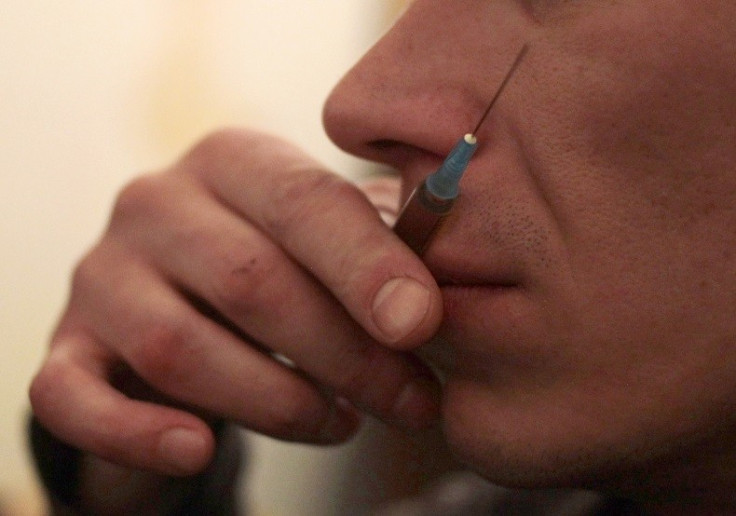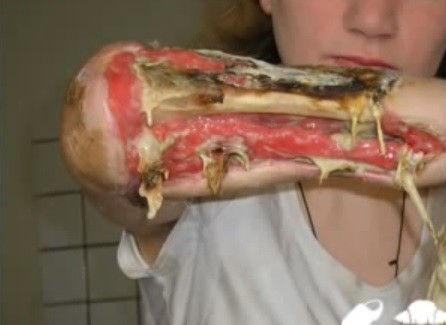Russia's Flesh-Eating Krokodil Drug an Urban Legend in UK, US and Canada

The deadly flesh-eating drug krokodil is not spreading throughout the US, Canada and the UK, despite reports suggesting otherwise.
Experts have said it is unlikely the drug has even really left Russia, as it is only used by people in remote parts of the country where heroin has become too expensive or unavailable - it is turned to as a last resort among addicts.
In September, reports emerged that two cases of krokodil users had been found in Phoenix, Arizona, at a drug treatment centre. Since then, reports of the drug emerging in several other states have surfaced, with suspected cases found in Illinois, Ohio and Missouri.
However the Drugs Enforcement Agency has categorically denied the drug has entered the US, with no laboratory confirmed cases found.
Rusty Payne, spokesman for the DEA, told IBTimes UK that while they are investigating, there is nothing to suggest the presence of krokodil.
"DEA is aware of and tracking the nation-wide reports of alleged abuse of the controlled substance desomorphine that is found in the drug krokodil, a homemade substitute for heroin invented and used in rural Russia, Georgia, Ukraine, and Kazakhstan.

"DEA is investigating the matter by acquiring samples alleged to contain desomorphine, interviewing drug abusers, and monitoring intelligence reports. To date, none of our forensic laboratories has analysed an exhibit found to contain desomorphine. A sample sent to our Chicago forensic laboratory that was suspected to be krokodil was actually heroin."
A similar picture has been painted in Canada, where two suspected cases were found in Niagara. Marc Paris, executive director of the Partnership for a Drug Free Canada, said: "We checked our sources and it seems that the reported potential cases in Niagara have been determined to be infections at heroin injection sites - flesh eating disease was mentioned in one conversation with the RCMP. So far there have been no confirmed cases of Krokodil in Canada.
"Obviously we are hoping it will stay that way. It seems Canadian addicts aren't facing the lack of access to heroin that the Russians were which started this whole horrific thing ... Both Toronto city police and the RCMP are staying vigilant."
Krokodil emerged in Russia about 10 years ago. It is cheaper than heroin as it is made from household items including codeine, gasoline and lighter fluid.
Last year, a study published in the Journal of Addictive Diseases looked at the emergence of krokodil and its potential spread to Germany. The authors noted that while there had been mass reporting on the drug, there was little to no scientific evidence to show its spread.
Explaining its origin, the authors said that the base drug is desomorphine, which is an opioid analogon first synthesised and patented in 1932 in the US. They said it is more addictive than morphine and was eventually withdrawn from the market.

Comparing it to krokodil, the study said: "The final product ... is a suspension that contains desomorphine as its psychoactive core agent and all other agents involved in the production process.
"Due to the various possible primary substrates that can be used for the manufacture of krokodil, it is most likely that - depending on the available basic substrates - the chemical composition of krokodil varies between users, especially regarding the spectrum and concentration of byproducts."
Assessing its risks, they wrote: "The active principle of krokodil is less a new drug rather than self-produced desomorphine accompanied by various toxic agents that emerge during the self-production process.
"Since 2003, the prevalence of krokodil use in Russia has been increasingly rapidly, presumably as a consequence of its low cost and its high dependence potential."
Explaining why stories about the drug have surfaced and spread to such a great extent, a spokesman for UK-based charity Addaction told IBTimes UK: "Anyone who has read about the drug will know that the visible 'flesh-eating' side-effects of Krokodil use are extremely gruesome.

"Many photos of users have been shared online, and on social media, and so the drug has become extremely well known, very quickly.
"However, it is important that people understand that use of the drug has not taken a foothold in the UK, or for that matter in many places outside of Russia. The coverage Krokodil has since gained in the UK press has certainly given the opposite impression.
"As clarification - at Addaction we are unaware of any instances of it being used in the UK, and conversations I've had with colleagues from across the treatment sector have confirmed this."
There are a number of factors that contribute to the rising number of users in Russia and the lack of transmission into Europe and the US.
Authorities in Russia have been particularly effective in stopping drugs trafficking, meaning heroin has become harder to get hold of and more expensive. Drug treatment options are also poor in comparison to what is offered in the UK. Where UK users can access treatment centres, in Russia most users chose to use cheaper substitutes instead of seeking help.

To gain any form of treatment, drug users in Russia have to register with the state, after which they are vastly discriminated against - they are prevented from getting jobs are denied driving licences.
Treatment centres are so poor Human Rights Watch said they violate the right to health. In 2006, 44 women undergoing treatment for drug dependence died in a fire in a rehabilitation hospital - bars on the windows meant they could not escape the blaze.
It has been suggested that rather than register as a user, in the absence of heroin drug addicts in Russia are turning to krokodil as a cheap alternative because the only other option is even less attractive.
The Addaction spokesman continued: "I think it is safe to say that nobody would use Krokodil out of choice, and risk suffering from its terrible side effects. Many Russian users will not have access to the kind of drug treatment available in the UK, and dependent drug users may well move to Krokodil (or desamorphine, as it is known) out of desperation and poverty.
"It is a miserable state of affairs, highlighting both the terrible power of addiction and the need for treatment who need it most."
© Copyright IBTimes 2024. All rights reserved.























